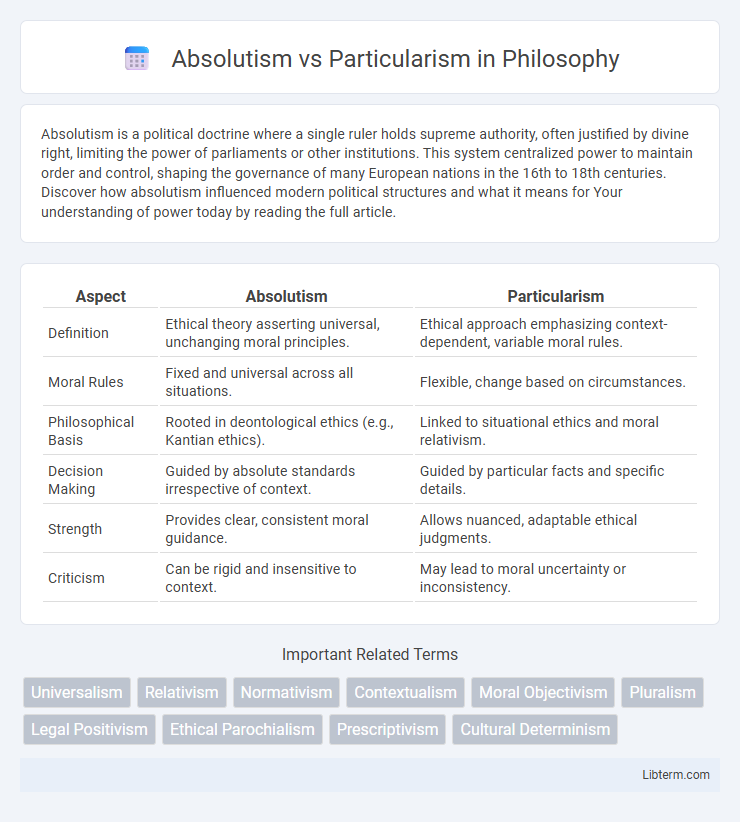Absolutism is a political doctrine where a single ruler holds supreme authority, often justified by divine right, limiting the power of parliaments or other institutions. This system centralized power to maintain order and control, shaping the governance of many European nations in the 16th to 18th centuries. Discover how absolutism influenced modern political structures and what it means for Your understanding of power today by reading the full article.
Table of Comparison
| Aspect | Absolutism | Particularism |
|---|---|---|
| Definition | Ethical theory asserting universal, unchanging moral principles. | Ethical approach emphasizing context-dependent, variable moral rules. |
| Moral Rules | Fixed and universal across all situations. | Flexible, change based on circumstances. |
| Philosophical Basis | Rooted in deontological ethics (e.g., Kantian ethics). | Linked to situational ethics and moral relativism. |
| Decision Making | Guided by absolute standards irrespective of context. | Guided by particular facts and specific details. |
| Strength | Provides clear, consistent moral guidance. | Allows nuanced, adaptable ethical judgments. |
| Criticism | Can be rigid and insensitive to context. | May lead to moral uncertainty or inconsistency. |
Understanding Absolutism and Particularism
Absolutism emphasizes universal rules and standards applied consistently across situations, promoting uniformity in decision-making and governance. Particularism prioritizes context-specific factors, valuing individual circumstances and relationships over general rules to guide actions and judgments. Understanding these concepts is essential for analyzing cultural, organizational, and legal approaches to authority and ethical decision-making.
Historical Origins of Absolutism and Particularism
Absolutism originated in the 16th and 17th centuries, primarily in France under monarchs like Louis XIV, characterized by centralized power and the divine right of kings. Particularism emerged in medieval Europe, especially in regions like the Holy Roman Empire, where fragmented political authority and local customs limited central control. The historical divergence between absolutism's centralized state and particularism's decentralized governance reflects varying responses to feudal fragmentation and the consolidation of sovereign power.
Key Philosophical Foundations
Absolutism in philosophy asserts that certain principles or truths are universally valid, grounded in unchanging moral laws or objective standards. Particularism challenges this by emphasizing the context-dependent nature of ethical judgments, where moral rightness varies according to situational factors without fixed rules. The foundational debate hinges on whether morality is best understood through immutable rules or adaptable, case-by-case evaluations.
Moral Absolutism: Core Principles
Moral absolutism asserts that certain ethical principles are universally valid, irrespective of culture, context, or individual circumstances. It emphasizes unwavering adherence to objective moral rules, such as honesty, justice, and respect for human rights, which are seen as absolute truths. This philosophical stance opposes moral relativism by promoting consistent application of these core principles across all situations and societies.
The Case for Particularism in Ethics
Particularism in ethics emphasizes the importance of context and specific details over fixed moral rules, arguing that moral judgment depends on the unique features of each situation rather than universal principles. This approach challenges absolutism by rejecting rigid moral codes, asserting that ethical decisions require sensitivity to the particularities of real-life circumstances. Philosophers like Jonathan Dancy highlight how particularism allows for a more flexible, nuanced understanding of moral reasoning, accommodating exceptions and complexities inherent in ethical dilemmas.
Contrasts in Legal and Political Systems
Absolutism centralizes authority under a single sovereign, enforcing uniform laws and centralized political control to maintain order and state power. Particularism emphasizes localized legal systems and political autonomy, allowing regions or groups to apply distinct laws and customs based on cultural or historical contexts. Contrasts between these systems impact governance, judicial consistency, and the balance between centralized authority and regional independence.
Cultural Impacts of Absolutist and Particularist Thought
Absolutism in cultural contexts fosters uniformity and centralized control over societal norms, often leading to standardized educational systems, national languages, and unified legal codes that reinforce state authority. Particularism, by contrast, supports diverse cultural expressions and local traditions, encouraging pluralism through respect for regional languages, customs, and decentralized governance structures. The tension between absolutist uniformity and particularist diversity shapes national identities, influencing cultural policies and the preservation or marginalization of minority groups.
Decision-Making: Absolutist vs Particularist Approaches
Absolutist decision-making relies on universal rules and clear-cut principles that apply consistently across all situations, ensuring predictability and uniformity in outcomes. Particularist decision-making emphasizes context and relationships, allowing flexibility and adaptation based on specific circumstances and individual needs. Organizations with an absolutist approach prioritize standardized policies, while particularist cultures favor situational judgments guided by social connections and unique factors.
Contemporary Debates and Applications
Contemporary debates on Absolutism vs Particularism center on their implications for cross-cultural ethics, with Absolutism advocating universal moral principles and Particularism emphasizing context-dependent judgments. In international law, Absolutism underpins human rights frameworks, while Particularism informs pluralistic approaches respecting cultural diversity. Emerging applications in global business ethics reveal tensions between enforcing standard codes of conduct and adapting to local customs to ensure ethical pluralism.
Finding Balance: Integrating Absolutism and Particularism
Finding a balance between absolutism, which emphasizes universal principles, and particularism, which values context-specific considerations, enhances ethical decision-making by incorporating both consistent standards and situational nuances. Integrating these approaches requires developing flexible frameworks that respect overarching norms while allowing adjustments in response to cultural, social, and individual differences. This balanced integration supports more effective governance, legal interpretation, and interpersonal relations by harmonizing clarity with adaptability.
Absolutism Infographic

 libterm.com
libterm.com